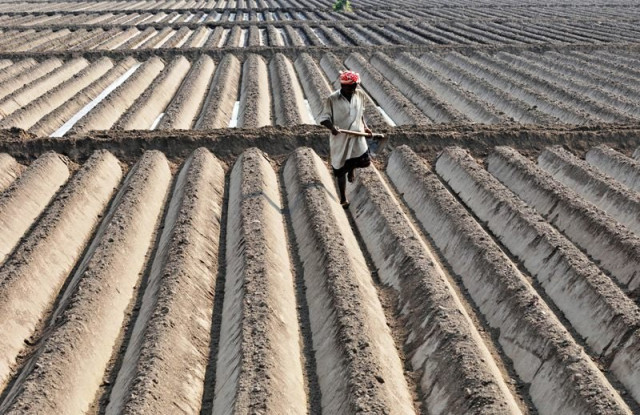Punjab plans agri reforms to enhance productivity
Revives advisory committees, will formulate a progressive policy.

"Pakistan is more vulnerable (to climate change) than any other country of the region," Punjab Agriculture Minister Dr Farrukh Javed. PHOTO: AFP/FILE
The Punjab government is eager to reform the agricultural sector in order to enhance crop productivity. It also wishes to bridge the gap between different stakeholders in order to ensure good coordination – steps that will lead to the development of agriculture and the prosperity of farmers.
Punjab Agriculture Minister Dr Farrukh Javed made statements to this effect while attending a briefing by University of Agriculture Faisalabad (UAF) Vice Chancellor Professor Dr Iqrar Ahmad Khan here on Saturday.
Javed said the Punjab government had revived district agricultural advisory committees and would take all stakeholders on board for formulating a progressive policy at the district level.
The provincial government will also inspect agricultural fields of small farmers to find out what contribution the extension staff has made and how they educate farmers and make suitable interventions in cropping patterns.
Javed termed climate change a big challenge that would drive the future dynamics of the country and the region at large. “Pakistan is more vulnerable than any other country of the region,” he said.
He stressed that changing rain patterns, floods, melting glaciers and rising temperature all called for greater research as well as adaptive and mitigating measures.
Praising the efforts of UAF engineers, who have designed an efficient biogas tube well, he vowed that the project would be upgraded at the provincial level.

He expressed the desire to establish a vibrant platform to bring all institutions and organisations on the table, aiming at promoting better coordination and integrating different projects.
Earlier, while briefing the minister, UAF VC Dr Iqrar Ahmad Khan referred to institutional reforms and agricultural development in the PML-N’s manifesto, saying the dream of making the country self-sufficient in edible oil would come true if the sowing of oilseed crops was promoted, which will curtail the present edible oil import bill.
Discussing future agricultural challenges, Khan underlined the need for producing 29 million tons of wheat annually in the next two years to feed the growing population and avert the challenges of food insecurity and poverty.
He suggested that the government intervene in cropping cycles to enhance farmers’ profits and get rid of middleman and market exploiters.
In an attempt to increase exports, UAF scientists have identified 10 mango varieties that can be marketed globally to earn millions of dollars in revenues.
The university also plans to open campuses in northern Punjab and the rice belt, in a bid to transform cropping cycles and to help increase productivity and profitability.
Published in The Express Tribune, June 16th, 2013.
Like Business on Facebook to stay informed and join in the conversation.



















COMMENTS
Comments are moderated and generally will be posted if they are on-topic and not abusive.
For more information, please see our Comments FAQ